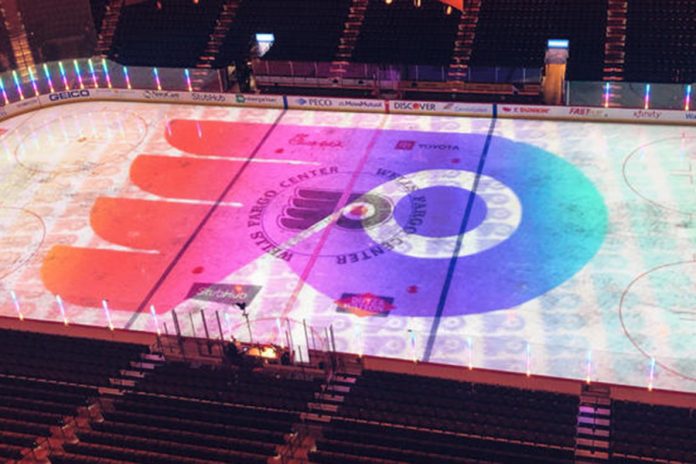Last week was the Philadelphia Flyers Pride Night at Wells Fargo Stadium, an event that also honored and interviewed Philadelphia Pride Organizer Franny Price.
While women’s sports have long been a platform for LGBTQ advocacy, men’s sports don’t have the same reputation for LGBTQ inclusivity. But, here’s hoping that can change. The Flyers and the rest of the NHL partnered with You Can Play — a nonprofit “dedicated to ensuring equality, respect and safety for all athletes, without regard to sexual orientation and/or gender identity” — to host pride events around the league.
On Pride night, rainbows were aplenty at Wells Fargo Stadium and players wrapped their hockey sticks in rainbow tape for warmups. Many LGBTQ folks were in attendance, and the Flyers happily welcomed PGN photographer Kelly Burkhardt. But LGBTQ advocacy is not enough if it lasts one night, and there are no openly LGBTQ players in the NHL. A forward on the Flyers’ AHL affiliate team Kurtis Gabriel has worn pride tape this entire season — perhaps a model for other athletes who want to truly take a stand.
Former NBA player Dwayne Wade and his wife Gabriel Union have become trans and gender-nonconforming activists in recent years, in support of Wade’s biological child Zion whose pronouns are she/her. The NBA, unlike the NFL and other professional sports leagues, is a political league, wherein players lobby for their rights, Black ownership and diverse representation in administrative offices and coaching positions. Many players have also publicly spoken about educational disparities, police brutality and economic disparities in Black communities — without facing repercussions by league leaders, and instead, support. (Take note NFL). But, Wade’s public championing of Zion and LGBTQ folks is an incredibly visible step forward for the intersection of men’s sports and queer advocacy. Jason Collins came out in 2013, but no one has since, making him the first and only person to do so in the NBA. In the men’s soccer World Cup in 2018, none of the athletes were openly gay.
The lack of LGBTQ visibility in men’s sports likely reflects the hyper- and toxically-masculine and homophobic culture we live in, where a lack of masculine posturing can be read as weakness. Having listened to many professional sports’ podcasts, I have often heard derogatory societally feminine terms hurled at a man who didn’t play well in the previous game. It’s time coaches, players, administrators, journalists and everyone else embedded in the world of men’s sports stand up against sexism, transphobia, homophobia, transmisogyny and all other forms of discrimination this community suffers.
